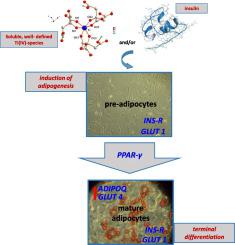Journal of Inorganic Biochemistry ( IF 3.8 ) Pub Date : 2020-11-02 , DOI: 10.1016/j.jinorgbio.2020.111290 O Tsave 1 , A Salifoglou 2

|
Metal-organic complexes bearing physiological substrates have been the target of several investigations, probing into the potential of well-defined atoxic metalloforms to influence fundamental cellular processes overcoming insulin resistance in Diabetes mellitus 2. Outstanding cases of such metals include zinc and vanadium, both being the target of intense synthetic and biological studies toward insulin mimesis. Owing to the close proximity in the periodic table, an early transition metal, titanium, emerges as another potential candidate of biologically relevant complexation, reflecting species capable of promoting insulin mimetic activity. Driven by the so far explored aqueous synthetic chemistry of Ti(IV)-hydroxycaboxylato systems, a well-defined Ti(IV)-citrate compound was synthesized under physiological conditions, isolated, and characterized, followed by its introduction in biological assays, targeting adipogenic events linked to glucose uptake and catabolism. The mononuclear Ti(IV)-citrate complex was introduced to 3T3-L1 cells, thereby probing into its biological activity (toxicity, morphology, migration, and adipogenic capacity). The results project an atoxic profile for the Ti(IV)-citrate species, thus justifying further incorporation in cellular differentiation processes, leading to mature adipocytes in a time- and concentration-dependent fashion. The experiments suggest that Ti(IV)-citrate is a competent agent promoting fibroblast differentiation, as evidenced by key adipogenic biomarkers, while concurrently exhibiting synergistic/enhancing action with insulin. The collective results show, for the first time, that an appropriately configured soluble-bioavailable complex Ti(IV) form exhibits a distinctly unique bioprofile, thereby lending credence to the notion that titanium metallopharmaceuticals hold merit as competent agents in adipogenesis and insulin mimesis in Diabetes mellitus.
中文翻译:

可溶性、明确定义的水性柠檬酸钛 (IV) 物质对脂肪生成的仿生活性。一项体外研究
带有生理底物的金属-有机复合物已成为多项研究的目标,探索明确定义的无毒金属型影响克服糖尿病 2 胰岛素抵抗的基本细胞过程的潜力。此类金属的突出案例包括锌和钒,两者都是胰岛素模拟的密集合成和生物学研究的目标。由于在元素周期表中非常接近,早期的过渡金属钛成为生物学相关络合的另一个潜在候选者,反映了能够促进胰岛素模拟活性的物种。在迄今为止探索的 Ti(IV)-羟基羧基体系的水性合成化学的推动下,在生理条件下合成了明确定义的 Ti(IV)-柠檬酸盐化合物,分离并表征,随后将其引入生物测定,针对与葡萄糖摄取和分解代谢相关的脂肪生成事件。将单核 Ti(IV)-柠檬酸复合物引入 3T3-L1 细胞,从而探究其生物活性(毒性、形态、迁移和脂肪生成能力)。结果表明,柠檬酸钛 (IV) 物质具有无毒特征,从而证明进一步掺入细胞分化过程是合理的,从而以时间和浓度依赖性方式导致成熟的脂肪细胞。实验表明,Ti(IV)-柠檬酸盐是一种促进成纤维细胞分化的有效物质,正如关键的脂肪生成生物标志物所证明的那样,同时与胰岛素表现出协同/增强作用。集体结果首次显示,











































 京公网安备 11010802027423号
京公网安备 11010802027423号